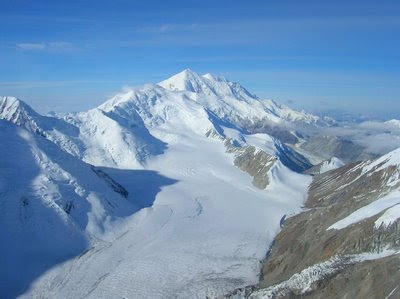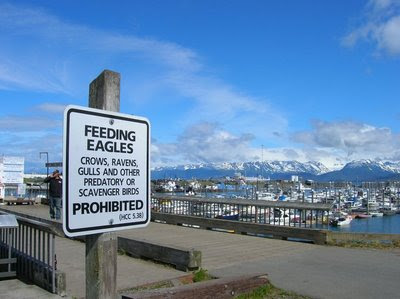 We just got back from a two-week family vacation to Alaska. Alaska is unique among these United States for many reasons. Alaska is a huge state: it has over twice the area of Texas and has more land than all but 18 of the Earth's sovereign nations. Alaska remained a territory for over 90 years (it celebrates its 50th anniversary of statehood next year), during which time Congress used Alaska's lack of representation in that body to its extreme advantage (to put it politely).
We just got back from a two-week family vacation to Alaska. Alaska is unique among these United States for many reasons. Alaska is a huge state: it has over twice the area of Texas and has more land than all but 18 of the Earth's sovereign nations. Alaska remained a territory for over 90 years (it celebrates its 50th anniversary of statehood next year), during which time Congress used Alaska's lack of representation in that body to its extreme advantage (to put it politely).(For more on Alaska's fight for statehood, I highly recommend reading "Let us end American colonialism," former Alaskan territorial governor Ernest Gruening's cogent 1955 speech to the Alaska Constitutional Convention, which was recently published by the Anchorage Press, an alternative newspaper similar to City Pages but not as caustically liberal.)
Thanks to a lack of federal funding while the continental U.S. was being criss-crossed with railroads, Interstate Highways, seaports, and airports, most of the highways that exist in Alaska today are two-lane highways, and many areas (including the state capital at Juneau) are accessible only by air or water. Some roads are closed entirely during the winter.
A fortunate unintended consequence of constricting settlement and commerce in Alaska before statehood in 1959 is that to this day, Alaska remains largely undeveloped and untamed, a rustic and often spectacular living postcard at every turn for residents and tourists to enjoy. The state population is only 670,053 (2006), and only a handful of towns have over 10,000 population. Only 1% of the land in Alaska is privately owned (an area that is a little larger than the state of Connecticut). The rest is managed by the Federal and state governments, and Native groups.
 Outside of Anchorage or Fairbanks, you won't find many big box retailers or franchises, light rail or stadiums, or even too many gas stations — just small towns, small businesses, campgrounds, fishing charters and guide services, glaciers, tiny espresso drive-thrus, a few volcanoes, and friendly people.
Outside of Anchorage or Fairbanks, you won't find many big box retailers or franchises, light rail or stadiums, or even too many gas stations — just small towns, small businesses, campgrounds, fishing charters and guide services, glaciers, tiny espresso drive-thrus, a few volcanoes, and friendly people.Most Alaskans like it that way. On a flightseeing trip over Mount McKinley (see photo), we saw many lake homes that are accessible only by seaplane, and perhaps by snowmobile or dog sled in the winter. Before statehood, white settlers and adventurers learned the art of dog sledding and pioneered bush aviation into remote areas. Native Alaskans (please don't call them "eskimos") still practice subsistence hunting and traditional ways of thriving in the land in which they feel chosen to live, while selectively adopting Western ways to preserve their way of life.
Alaska is derived from a native Aleut word, Alyeska, meaning "The Great Land." It's a remarkable and uniquely American place with a politics all its own, which I will discuss in my next post.




No comments:
Post a Comment